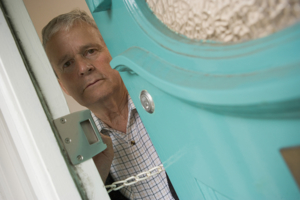How to Help a Loved One with Alzheimer’s when Wandering Occurs

Alzheimer’s disease often causes a person to wander, possibly into a dangerous situation. Learn more about how to keep your loved one’s home safe to prevent wandering.
Of the numerous ramifications of Alzheimer’s disease, perhaps one of the most worrying is the person’s tendency for wandering and also the potential dangers that can develop if the senior becomes disoriented or lost. Alzheimer’s wandering can occur any time the older adult is:
- Frightened, confused or overwhelmed
- Searching for someone or something
- Bored
- Attempting to preserve a familiar past routine (for example, going to a job or shopping)
- Taking care of a simple necessity (such as getting a drink of water or going to the bathroom)
The objective is twofold; to help keep your loved one safe, as well as to make certain his / her needs are fulfilled to try and stop the desire to wander. Try the following safety measures if your senior loved one is likely to wander:
- Make sure the home is equipped with a security system and locks that the senior is not able to master, such as a sliding bolt lock above his or her range of vision. A variety of alarms can be found, from something as simple as placing a bell over door knobs, to highly-sensitive pressure mats which will sound an alarm when stepped on, to GPS products that may be worn, and more. It is also wise to register for the Alzheimer’s Association’s Safe Return Program.
- Conceal exits by covering up doors with curtains, positioning short-term folding barriers strategically around doorways, or by wallpapering or painting doors to match the surrounding walls. You could also try placing “NO EXIT” signs on doors, which can sometimes dissuade those in the earlier stages of dementia from trying to exit.
- Another danger for those who wander is the elevated risk of falling. Go through each room of the home and tackle any tripping concerns, such as removing throw rugs, extension cords, and any obstacles which might be obstructing walkways, installing extra lighting, and placing gates at the top and bottom of stairways.
It’s important to keep in mind that with guidance and direction, wandering is not necessarily a problem. Take a walk with each other outside if weather allows and the senior is in the mood to be mobile, providing the added benefit of fresh air, physical exercise, and quality time together.
Although often difficult to manage, the dementia care team at Responsive Home Care, Sunrise home health care leaders, is specially trained to be equally vigilant and proactive in deterring wandering and to employ creative approaches to help seniors with dementia stay relaxed and content. Reach out to us at 954-486-6440 to learn more about Alzheimer’s wandering and other dementia tips! View our full service area.
